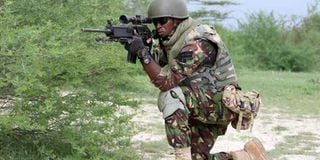Kenyan troops change bases in Somalia

A KDF soldier takes aim during patrol in Afmadow Town, Somalia on November 22, 2015. The UN Department of Field Support has already started training 60 Kenyan soldiers at the Humanitarian Peace Support School, Embakasi Garrison. PHOTO | JEFF ANGOTE | NATION MEDIA GROUP
What you need to know:
- Military spokesman David Obonyo on Tuesday said the move would ensure that Sector 2 is secured from the terrorists.
Sector 2 comprises Gedo, Middle and Lower Juba regions.
BBC reported that Kenyan troops had withdrawn from El-Adde in southern Somalia following the attack on January 15.
Wednesday's memorial for fallen soldiers will be held at Moi Barracks in Eldoret, the home of the 9KR battalion.
Kenyan troops in Somalia are setting up new bases, with the aim of strengthening their presence in that country in the wake of the El-Adde attack by Al-Shabaab.
Military spokesman David Obonyo on Tuesday said the move would ensure that Sector 2 (the area assigned to the Kenya Defence Forces by the African Union Mission in Somalia) is secured from the terrorists.
“We are in Somalia under Amisom, which still has a mandate there, so we cannot just abandon its responsibility,” said Col Obonyo. “We are still manning our areas of operation in Sector 2, which is an expansive area and we can take defence positions in any part of that region.”
Sector 2 comprises Gedo, Middle and Lower Juba regions.
There are more Kenyan troops in Kismayu, another region where Djibouti troops have also been deployed and most recently, Ethiopian contingents.
Foreign media had earlier Tuesday reported that Kenyan troops were withdrawing from El-Adde and Fafadhum towns, information attributed to residents who were quoted as saying there was movement of troops.
BBC reported that Kenyan troops had withdrawn from El-Adde in southern Somalia following the attack on January 15.
However, Col Obonyo said movement of troops was expected anywhere within Sector 2 and should not be construed to mean withdrawal from the region.
“After all, there is a reason that took us to Somalia, which is to liberate and pacify those areas, and the mission is still on,” he added.
During the attack, the camp was overran and both sides suffered heavy casualties.
Kenya is still in the process of identifying the soldiers who died in the attack and Wednesday, a special memorial will be held in Eldoret.
Military headquarters has, however, remained tight lipped on the death toll, the number of survivors as well as those missing in action.
The El-Adde camp was recaptured four days after the initial attack when reinforcements were sent in from Mandera, Wajir and El-wak.
BAD NEWS
Last week, Chief of Defence Forces Samson Mwathethe said the figures would be made public after investigations by a board of inquiry, which he said he had appointed and sent to Somalia.
However, he seemed to prepare the public for bad news when the death toll is finally announced when he revealed that bombs used during the ambush at the camp had a force equivalent to three times that of the bomb that hit the US embassy in Nairobi in 1998
The embassy blast killed 250 people.
Gen Mwathethe said: “You can imagine that one vehicle bomb that went through the US embassy in Nairobi did such damage. You can imagine three of those in that small defensive position.”
The El-Adde camp was primarily occupied by soldiers from the 9 Kenya Rifles battalion. It was a company size, usually consisting of about 120 soldiers, but there were other KDF support units from Gilgil and Kahawa barracks.
The troops were just two weeks old at the camp, having replaced another batch that had completed its annual tour of duty.
Wednesday's memorial will be held at Moi Barracks in Eldoret, the home of the 9KR battalion.
President Uhuru Kenyatta, who is also the Commander-in-Chief is expected to attend, accompanied by President Muhammadu Buhari of Nigeria and Somali President Hassan Sheikh Mohamud.
Some of the bodies of the fallen soldiers were flown to Nairobi, their caskets draped in the national flag.
At the same time, DNA samples have been taken from relatives to help in identifying the fallen soldiers, particularly those whose bodies were blown to pieces.
Help desks have been established at the Defence Forces Memorial Hospital in Nairobi and in Gilgil, Eldoret and Mombasa to counsel the relatives and give them information about their loved ones.




